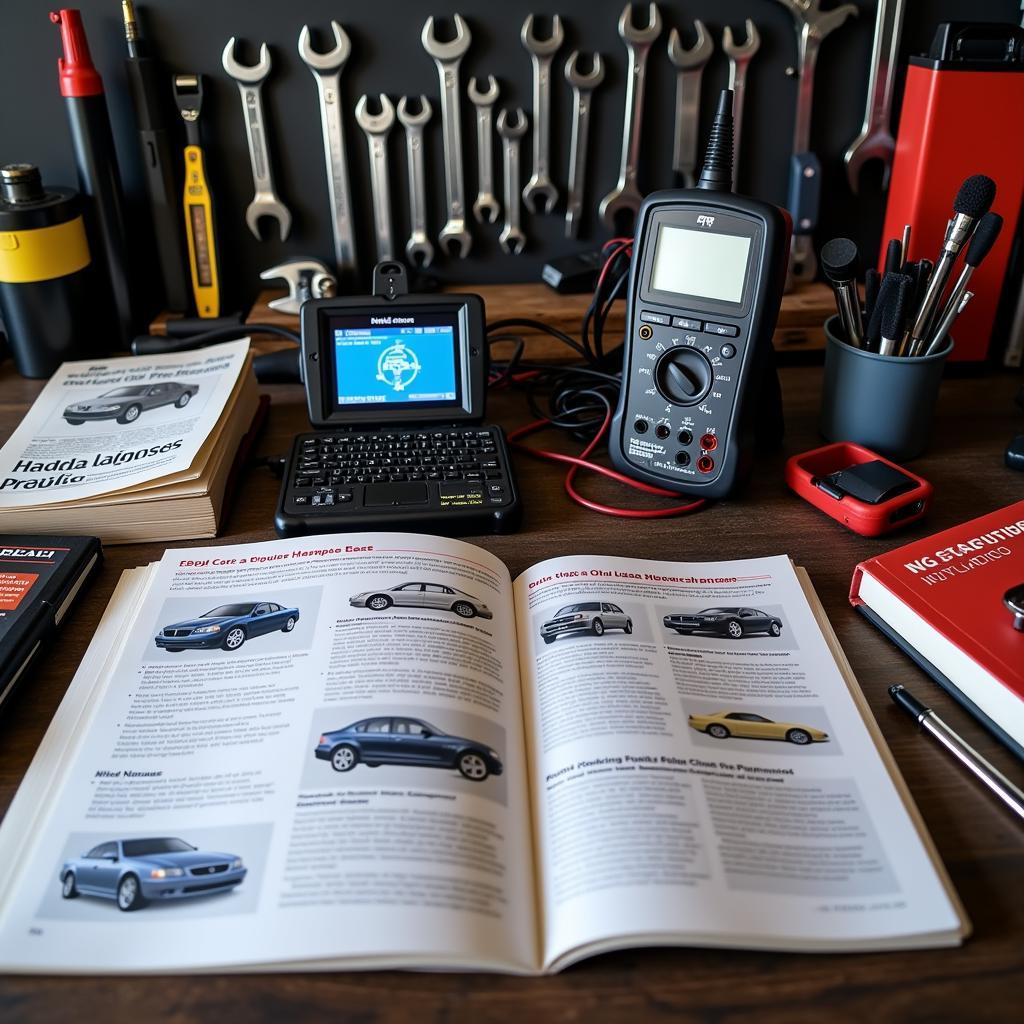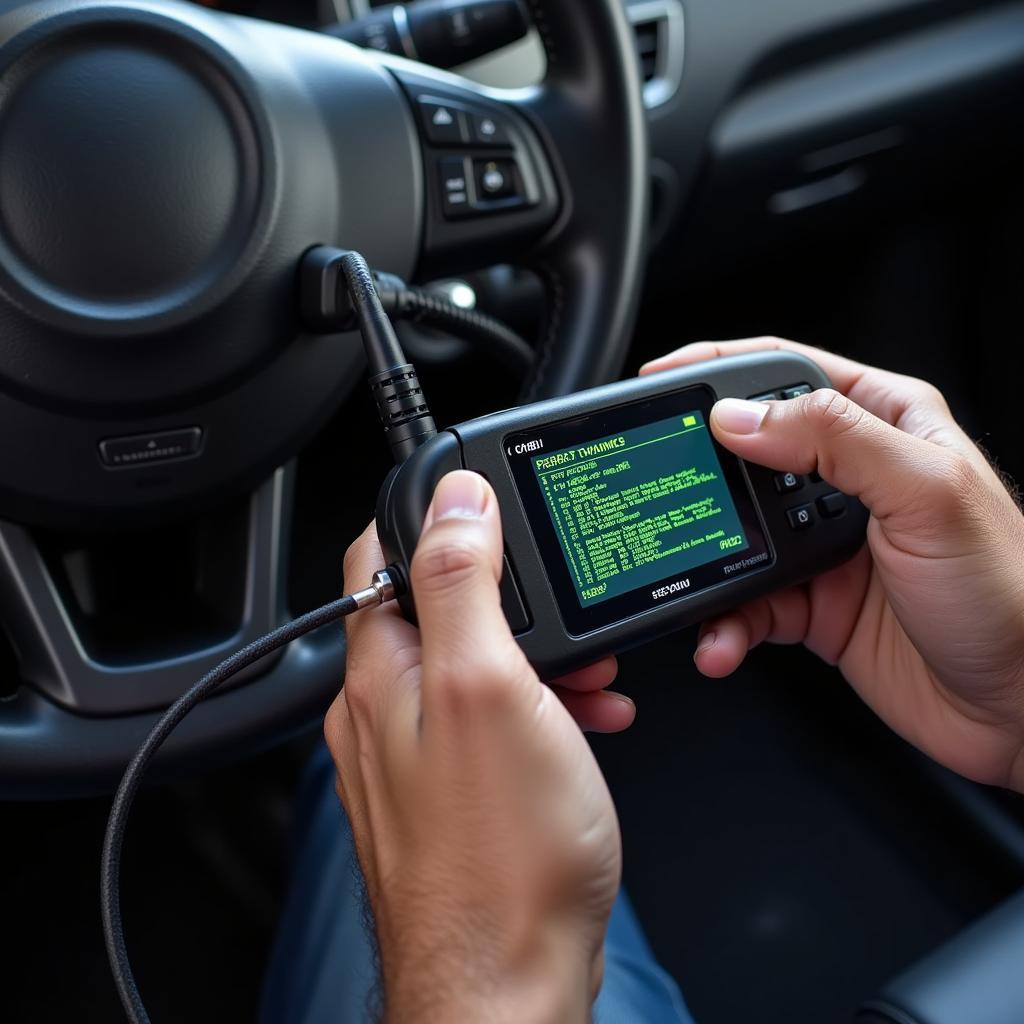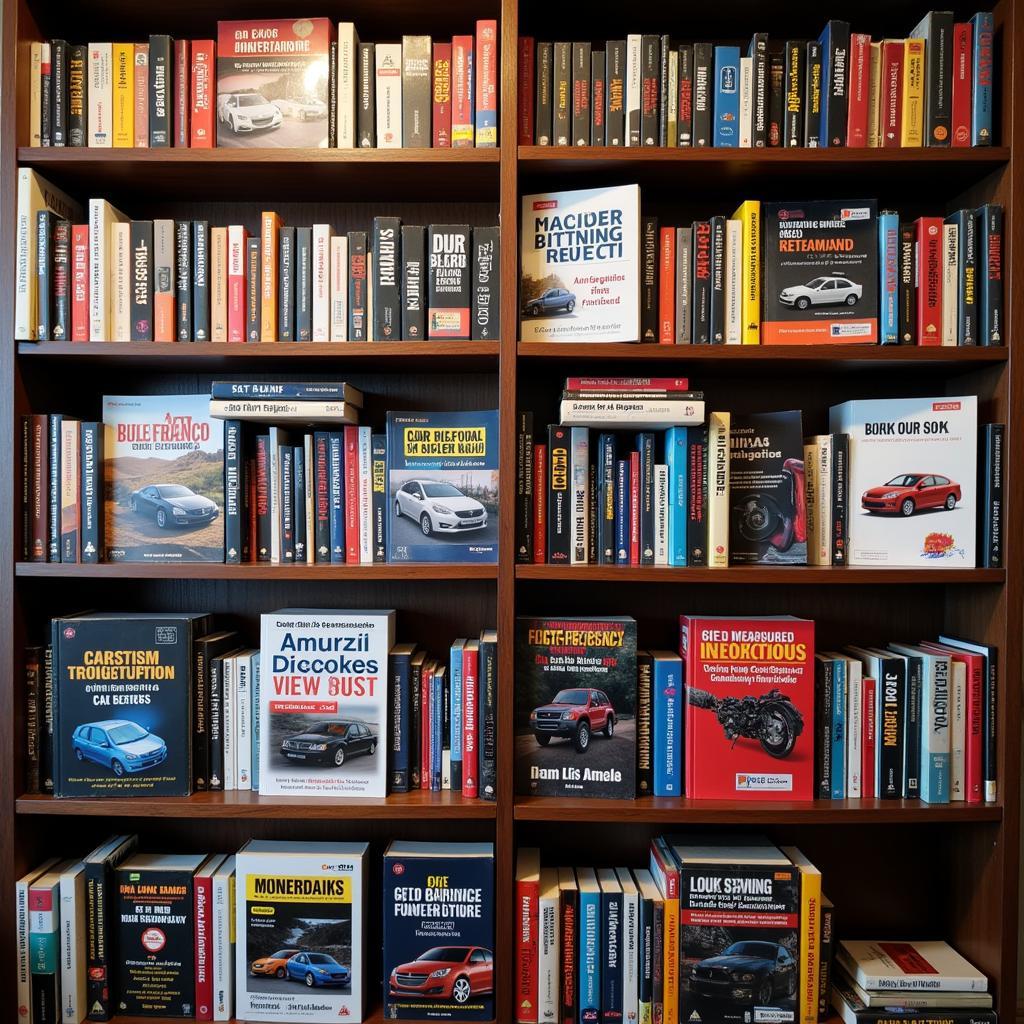Car diagnostics can feel like navigating a maze, especially with the increasing complexity of modern vehicles. Whether you’re a seasoned mechanic or a DIY enthusiast, having the right tools, manuals, and books for car diagnostics is crucial. This guide will explore the essential resources you need to effectively diagnose and troubleshoot car problems, covering everything from basic tools to advanced diagnostic software. You’ll find the perfect combination of tools, manuals, and books to become a car diagnostics expert. Check out our guide on learning car diagnostics.
Understanding the Importance of Car Diagnostic Resources
Effective car diagnostics requires more than just a wrench and a prayer. A proper diagnosis relies on a combination of technical knowledge, practical skills, and the right resources. These resources, including tools, manuals, and books, provide the information and capabilities needed to accurately pinpoint the root cause of automotive issues. Without them, you’re essentially working in the dark, potentially wasting time and money on unnecessary repairs.
Why Tools are Essential
Diagnostic tools range from simple handheld devices to complex computer systems. These tools allow you to read error codes, monitor live data streams, and perform various tests to identify faulty components. Investing in quality tools can significantly improve your diagnostic efficiency and accuracy.
The Role of Manuals and Books
While tools provide the practical means for testing, manuals and books offer the essential theoretical background. Repair manuals provide specific instructions for your car model, covering everything from routine maintenance to complex repairs. Diagnostic books delve deeper into the principles of automotive systems and troubleshooting techniques.
 Car Diagnostic Tools and Manuals Spread Out on a Workbench
Car Diagnostic Tools and Manuals Spread Out on a Workbench
Choosing the Right Car Diagnostic Tools
The right tools for you depend on your skill level and the type of diagnostics you intend to perform. Here’s a breakdown of some essential tools:
- OBD-II Scanner: A must-have for reading and clearing diagnostic trouble codes (DTCs).
- Multimeter: Essential for testing electrical circuits and components.
- Test Light: A simple tool for checking for power and ground connections.
- Pressure Gauge: Used for testing fuel pressure, oil pressure, and other critical system pressures.
- Vacuum Gauge: Helpful for diagnosing engine performance issues.
Specific Tools for Advanced Diagnostics
- Oscilloscope: Allows you to visualize electrical signals and waveforms.
- Scan Tool with Bi-directional Control: Enables you to activate components for testing purposes.
- Specialized Software: Provides access to advanced diagnostic functions and data.
Navigating the World of Car Manuals and Books
With a plethora of manuals and books available, finding the right ones can be overwhelming. Here’s what to consider:
- Vehicle-Specific Repair Manuals: These manuals provide detailed instructions for your specific car model. For example, Haynes manuals offer comprehensive guides covering various makes and models. Explore resources like Haynes car diagnostic for more.
- Diagnostic Guides: These books delve into the theory and practice of car diagnostics, covering various systems and troubleshooting techniques. Check out our recommendation on a modern car diagnostics book.
- Online Resources: Numerous websites and forums offer valuable information and support for car diagnostics.
 Mechanic Using OBD-II Scanner on a Car’s Diagnostic Port
Mechanic Using OBD-II Scanner on a Car’s Diagnostic Port
Building Your Car Diagnostic Library
Creating a comprehensive library of tools, manuals, and books is an investment that will pay off in the long run. Start with the essential tools and gradually expand your collection as your skills and needs evolve. Consider building a tool bag for your car to keep everything organized.
Tips for Choosing Resources
- Focus on Quality: Invest in reputable brands and publications known for their accuracy and reliability.
- Consider Your Skill Level: Choose resources that match your current knowledge and experience.
- Stay Updated: Automotive technology is constantly evolving, so keep your resources current. Find a curated list of car diagnostics books to stay up-to-date.
“A proper diagnosis is half the battle when it comes to car repair,” says John Smith, Senior Automotive Technician at Elite Auto Repair. “Having the right tools and information at your fingertips can save you countless hours of frustration and unnecessary expenses.”
Conclusion
Mastering car diagnostics empowers you to maintain and repair your vehicle effectively. By investing in the right tools, manuals, and books for car diagnostics, you equip yourself with the knowledge and capabilities to confidently tackle automotive issues, ultimately saving time and money. Start building your diagnostic arsenal today and take control of your car’s health.
Expert Quote: “Investing in quality diagnostic resources is an investment in your car’s longevity,” says Sarah Jones, Lead Diagnostic Specialist at AutoTech Solutions. “Accurate diagnostics prevent misdiagnosis and unnecessary repairs, saving you money in the long run.”
FAQ
- What is an OBD-II scanner? An OBD-II scanner is a device used to read and clear diagnostic trouble codes (DTCs) from a vehicle’s onboard computer.
- Why is a multimeter important for car diagnostics? A multimeter is essential for testing electrical circuits and components, allowing you to measure voltage, current, and resistance.
- Where can I find vehicle-specific repair manuals? Vehicle-specific repair manuals can be found online, at auto parts stores, and from publishers like Haynes.
- What are some essential tools for beginners in car diagnostics? Essential tools for beginners include an OBD-II scanner, multimeter, test light, and basic hand tools.
- How do I stay updated on the latest car diagnostic techniques? Staying updated involves attending workshops, reading industry publications, and engaging with online automotive communities.
 Collection of Car Diagnostic Books on a Shelf
Collection of Car Diagnostic Books on a Shelf
Need Help? Contact us via WhatsApp: +1(641)206-8880, Email: [email protected] or visit us at 910 Cedar Lane, Chicago, IL 60605, USA. Our 24/7 customer support team is ready to assist you.

Leave a Reply